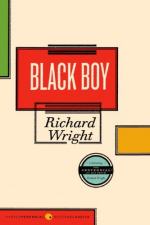|
This section contains 6,841 words (approx. 23 pages at 300 words per page) |

|
SOURCE: "Richard Wright and the African American Autobiography Tradition," in Style, Vol. 27, No. 2, Summer, 1993, pp. 271-84.
In the following essay, Andrews identifies Richard Wright's Black Boy (American Hunger) as a defining work in the tradition of African American autobiography.
To tell the whole truth in the name of complete honesty or to conceal part of the truth out of deference to white readers' sensibilities—this dilemma and the anxiety it spawned have haunted African-American autobiography since its beginnings. The earliest black American autobiographers frequently commented on their unique dilemma: speak forthrightly and be thought a liar or censor oneself in the hope of being believed. Antebellum slave narrators introduced what Robert Stepto has called "distrust of the reader" into African-American autobiographical discourse by admitting, in the classic formulation of Harriet Jacobs, "I have not exaggerated the wrongs inflicted by Slavery; on the contrary, my descriptions fall far short...
|
This section contains 6,841 words (approx. 23 pages at 300 words per page) |

|


